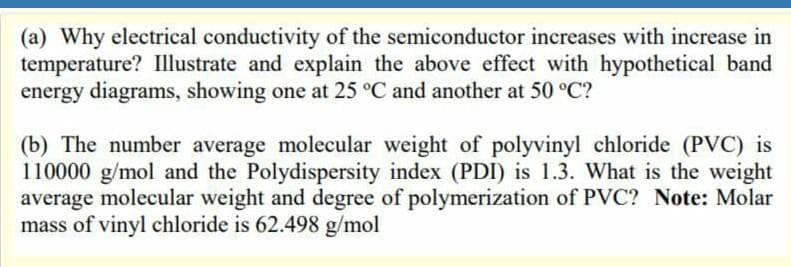(a) Why electrical conductivity of the semiconductor increases with increase in temperature? Illustrate and explain the above effect with hypothetical band energy diagrams, showing one at 25 °C and another at 50 °C? (b) The number average molecular weight of polyvinyl chloride (PVC) is 110000 g/mol and the Polydispersity index (PDI) is 1.3. What is the weight average molecular weight and degree of polymerization of PVC? Note: Molar mass of vinyl chloride is 62.498 g/mol
(a) Why electrical conductivity of the semiconductor increases with increase in temperature? Illustrate and explain the above effect with hypothetical band energy diagrams, showing one at 25 °C and another at 50 °C? (b) The number average molecular weight of polyvinyl chloride (PVC) is 110000 g/mol and the Polydispersity index (PDI) is 1.3. What is the weight average molecular weight and degree of polymerization of PVC? Note: Molar mass of vinyl chloride is 62.498 g/mol
Principles of Modern Chemistry
8th Edition
ISBN:9781305079113
Author:David W. Oxtoby, H. Pat Gillis, Laurie J. Butler
Publisher:David W. Oxtoby, H. Pat Gillis, Laurie J. Butler
Chapter22: Inorganic Materials
Section: Chapter Questions
Problem 13P
Related questions
Question

Transcribed Image Text:(a) Why electrical conductivity of the semiconductor increases with increase in
temperature? Illustrate and explain the above effect with hypothetical band
energy diagrams, showing one at 25 °C and another at 50 °C?
(b) The number average molecular weight of polyvinyl chloride (PVC) is
110000 g/mol and the Polydispersity index (PDI) is 1.3. What is the weight
average molecular weight and degree of polymerization of PVC? Note: Molar
mass of vinyl chloride is 62.498 g/mol
Expert Solution
This question has been solved!
Explore an expertly crafted, step-by-step solution for a thorough understanding of key concepts.
Step by step
Solved in 2 steps

Knowledge Booster
Learn more about
Need a deep-dive on the concept behind this application? Look no further. Learn more about this topic, chemistry and related others by exploring similar questions and additional content below.Recommended textbooks for you

Principles of Modern Chemistry
Chemistry
ISBN:
9781305079113
Author:
David W. Oxtoby, H. Pat Gillis, Laurie J. Butler
Publisher:
Cengage Learning

Chemistry: The Molecular Science
Chemistry
ISBN:
9781285199047
Author:
John W. Moore, Conrad L. Stanitski
Publisher:
Cengage Learning

Physical Chemistry
Chemistry
ISBN:
9781133958437
Author:
Ball, David W. (david Warren), BAER, Tomas
Publisher:
Wadsworth Cengage Learning,

Principles of Modern Chemistry
Chemistry
ISBN:
9781305079113
Author:
David W. Oxtoby, H. Pat Gillis, Laurie J. Butler
Publisher:
Cengage Learning

Chemistry: The Molecular Science
Chemistry
ISBN:
9781285199047
Author:
John W. Moore, Conrad L. Stanitski
Publisher:
Cengage Learning

Physical Chemistry
Chemistry
ISBN:
9781133958437
Author:
Ball, David W. (david Warren), BAER, Tomas
Publisher:
Wadsworth Cengage Learning,